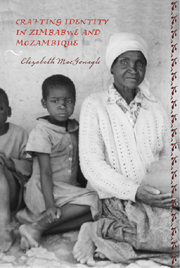Book contents
- Frontmatter
- Contents
- List of Illustrations
- Acknowledgments
- 1 A Mixed Pot: The Crafting of Identity
- 2 The Historical Landscape of Southeast Africa
- 3 Early Exchanges: Political and Economic Contexts
- 4 Ties That Bind: Social Structures and Cultural Practices
- 5 Keeping up Appearances: Identity and Adornment
- 6 Brewing Beer, Making Rain, and Holding Court
- 7 Memories and Identities in the Shadow of Ngungunyana
- 8 Past and Present in the Ndau Region
- Notes
- Glossary of Ndau and Portuguese Words
- Bibliography
- Index
- Rochester Studies in African History and the Diaspora
8 - Past and Present in the Ndau Region
Published online by Cambridge University Press: 12 September 2012
- Frontmatter
- Contents
- List of Illustrations
- Acknowledgments
- 1 A Mixed Pot: The Crafting of Identity
- 2 The Historical Landscape of Southeast Africa
- 3 Early Exchanges: Political and Economic Contexts
- 4 Ties That Bind: Social Structures and Cultural Practices
- 5 Keeping up Appearances: Identity and Adornment
- 6 Brewing Beer, Making Rain, and Holding Court
- 7 Memories and Identities in the Shadow of Ngungunyana
- 8 Past and Present in the Ndau Region
- Notes
- Glossary of Ndau and Portuguese Words
- Bibliography
- Index
- Rochester Studies in African History and the Diaspora
Summary
You also became Ndau because you speak the Ndau language, are born of Ndau parents, so you are Ndau.
—Ellen GaparaWe are now a mixed pot, it is no longer Ndaus only.
—Idah ManyuniOver a four-hundred-year period in central Mozambique and eastern Zimbabwe, the Ndau actively crafted their own identity and gave it meaning. Amid the continuities and changes of centuries, the Ndau forged a sense of identity that has come to resemble a mixed pot. Today Ndauness is present throughout the region, but it is neither prominent nor particularly striking to the casual observer. A closer look at the present reveals influential legacies from the past that linger in this corner of southeast Africa. The multiple meanings inherent in cultural rememberings of Ndau history demonstrate the intricate nature of histories and identities. Elders preserve historical memories and use them either to support or to suppress ethnic identification. The Ndau have reconstructed memories and oral traditions to address contemporary realities, and the recent war between Renamo and the government in Mozambique has strongly influenced histories and relationships on both sides of the border. My investigation of Ndau history since the sixteenth century reveals that neither the pressures of colonialism nor the politics of nationalism created a sense of being Ndau. Evidence shows that Ndauness, while not reflecting a deep primordial allegiance, was shaped as an ongoing practice in the precolonial period.
- Type
- Chapter
- Information
- Crafting Identity in Zimbabwe and Mozambique , pp. 106 - 114Publisher: Boydell & BrewerPrint publication year: 2007



